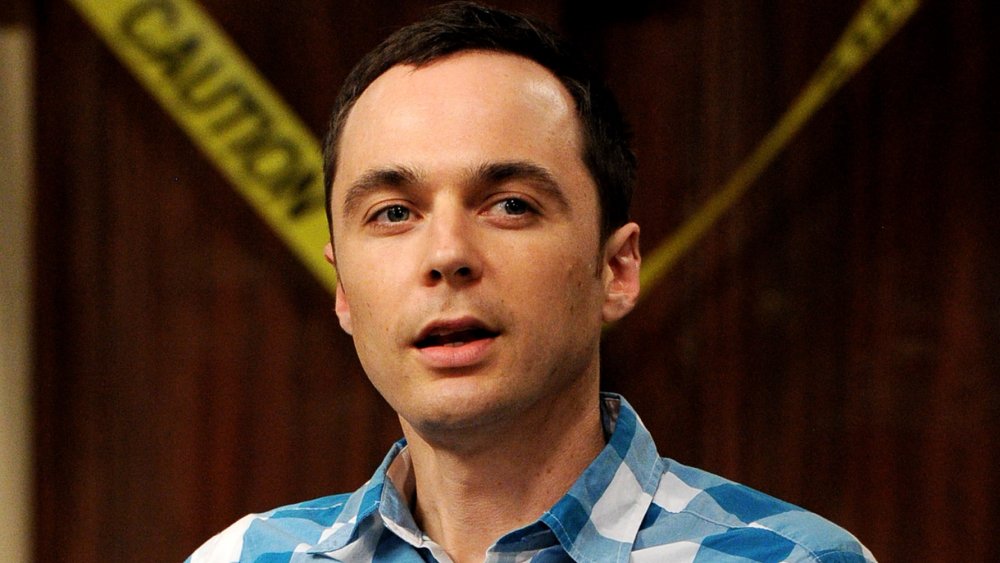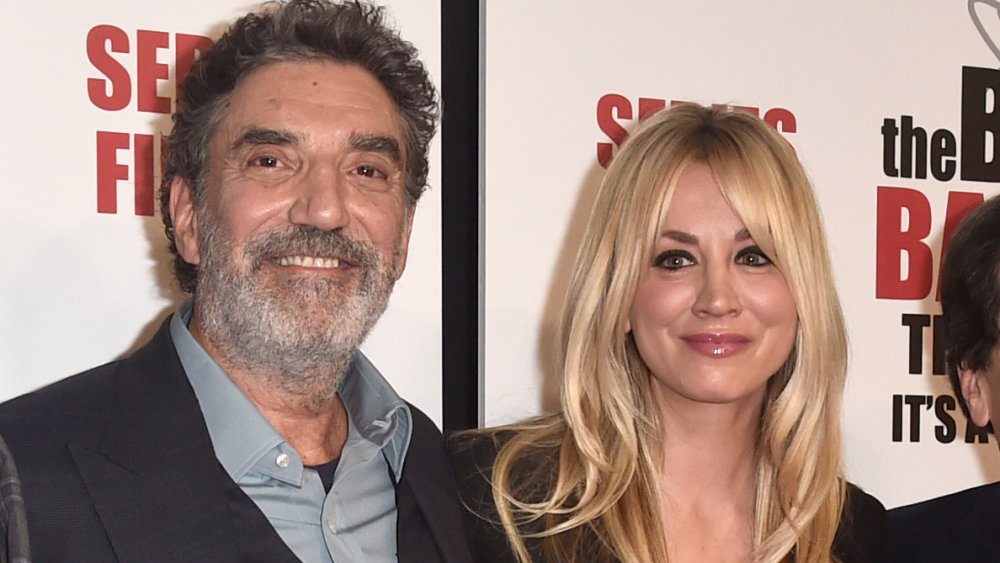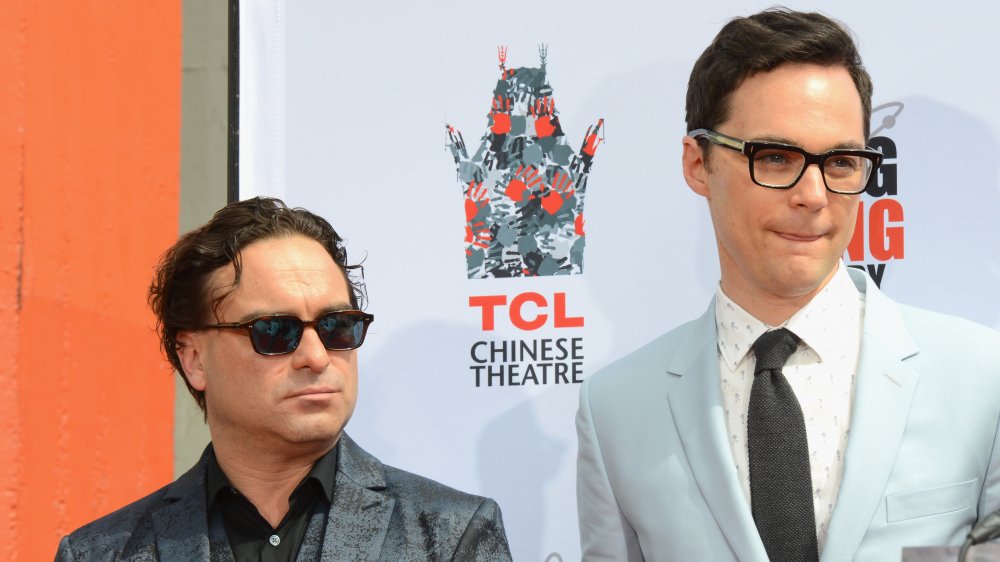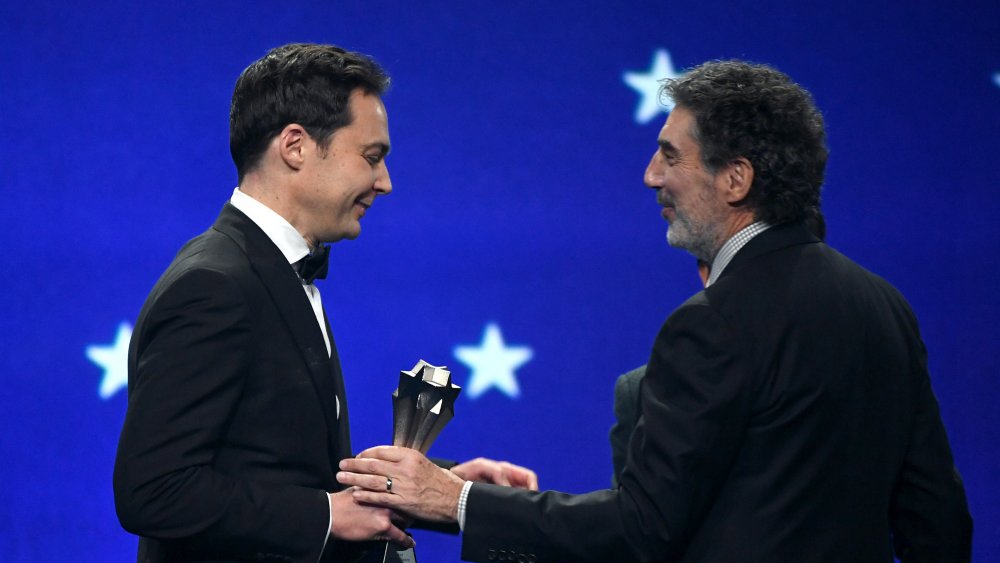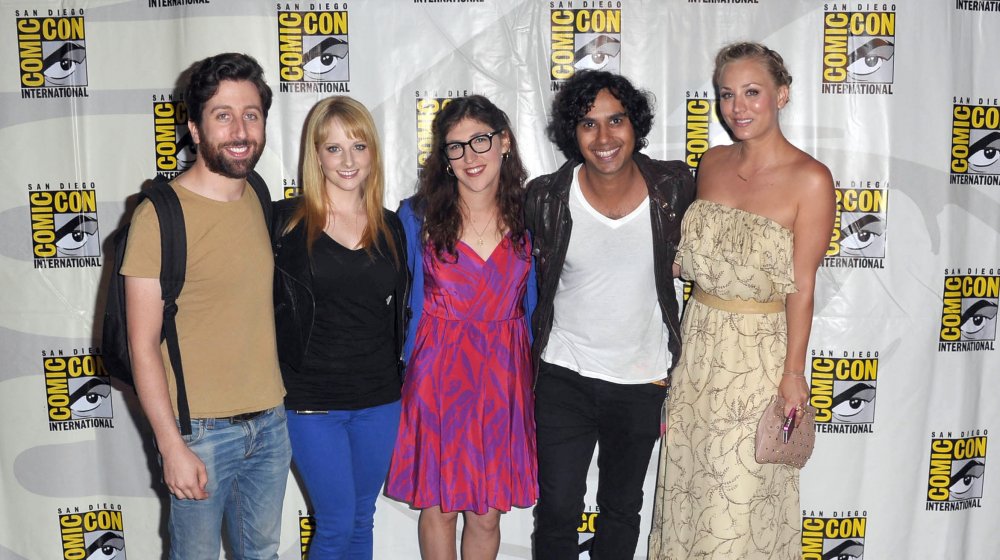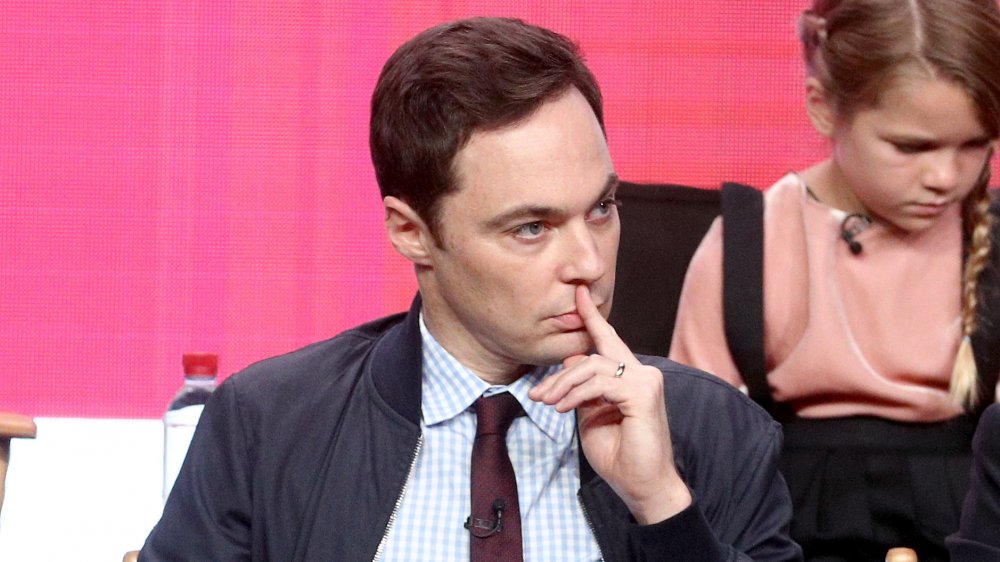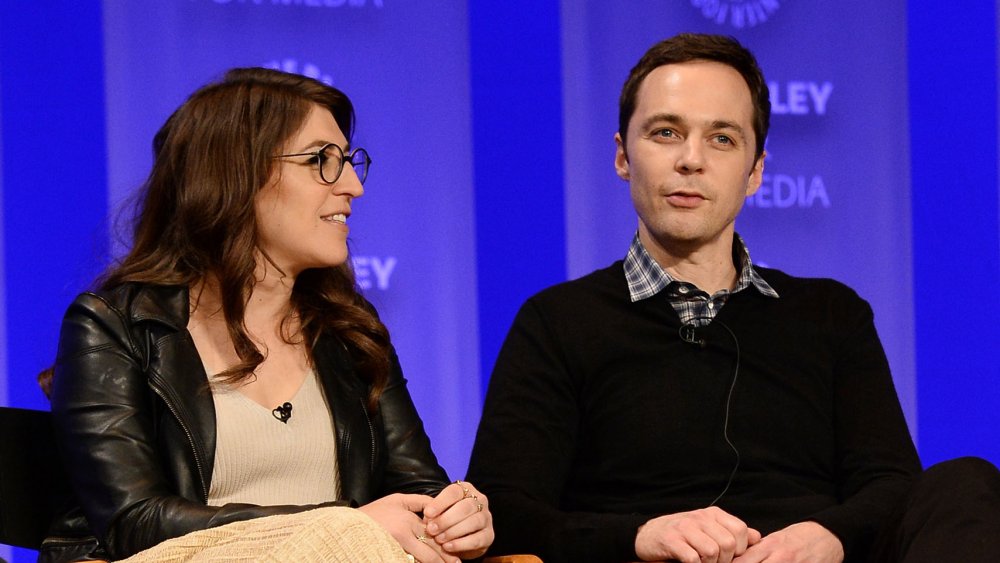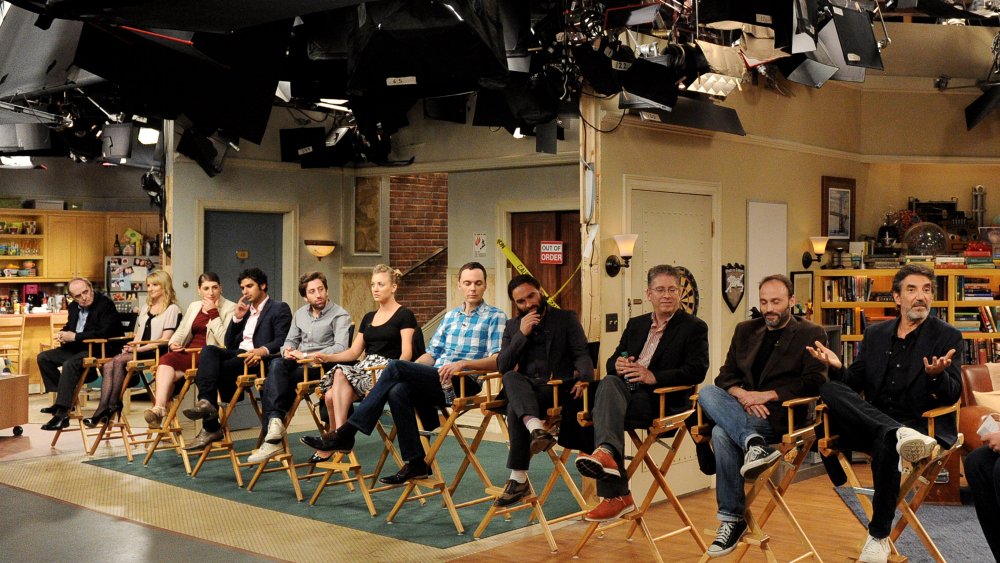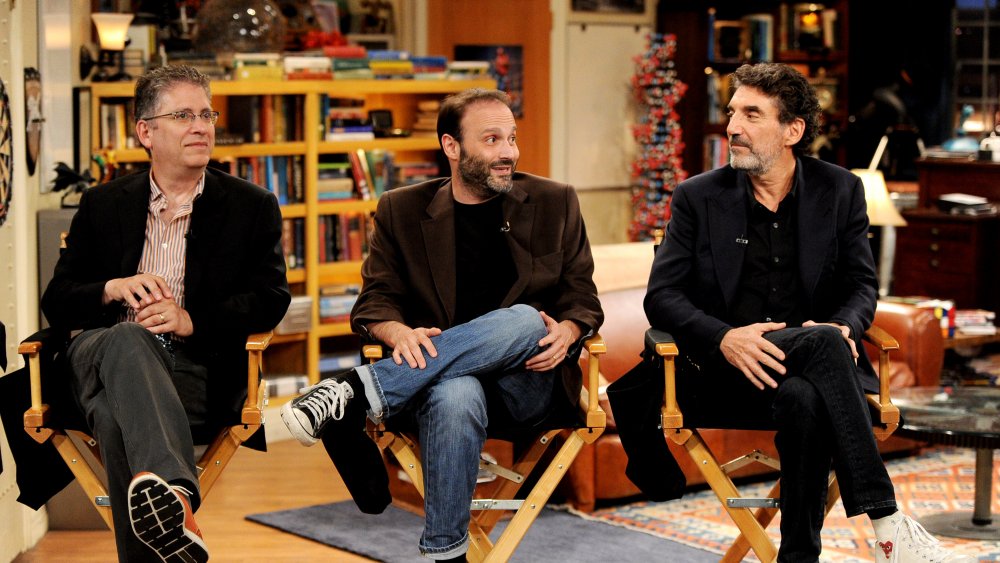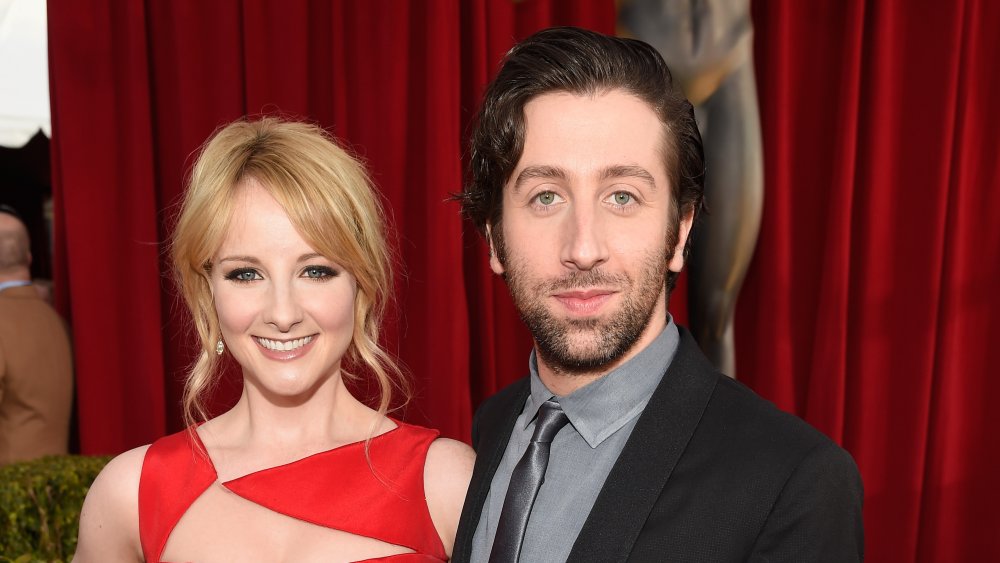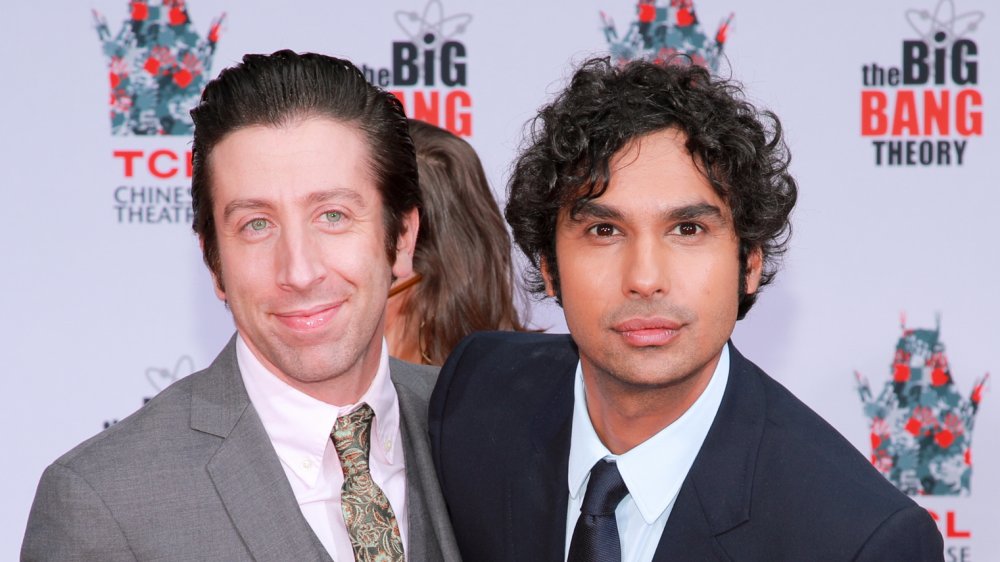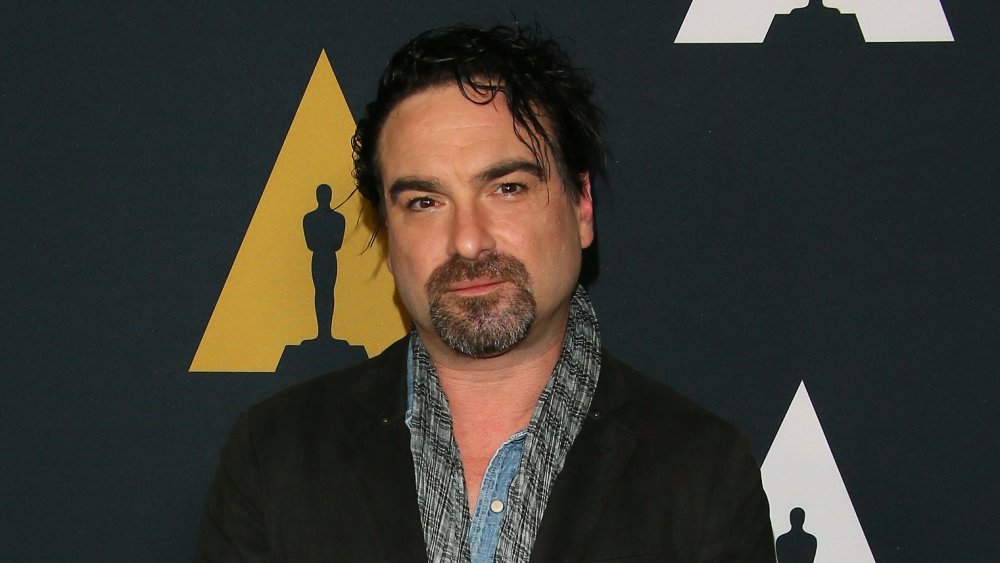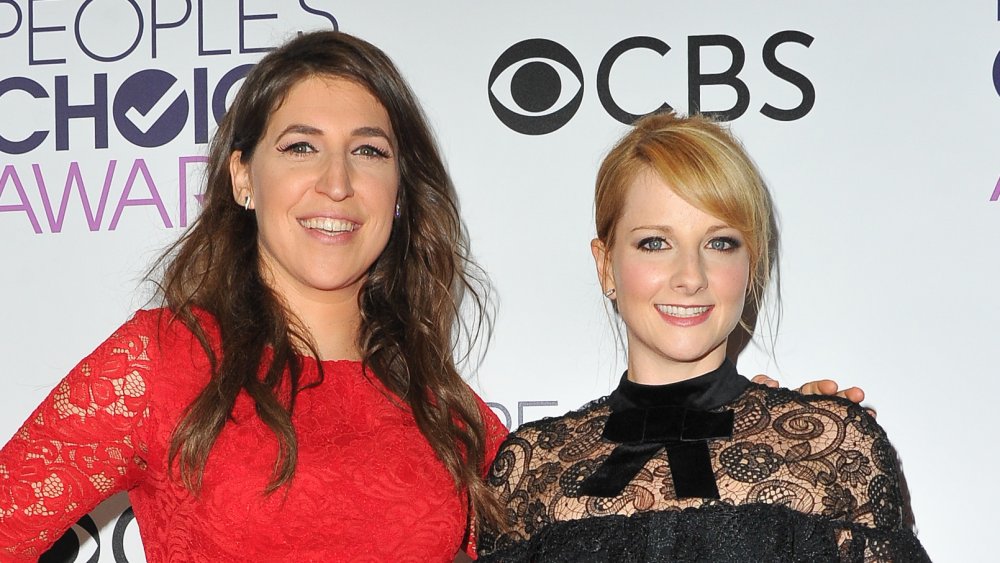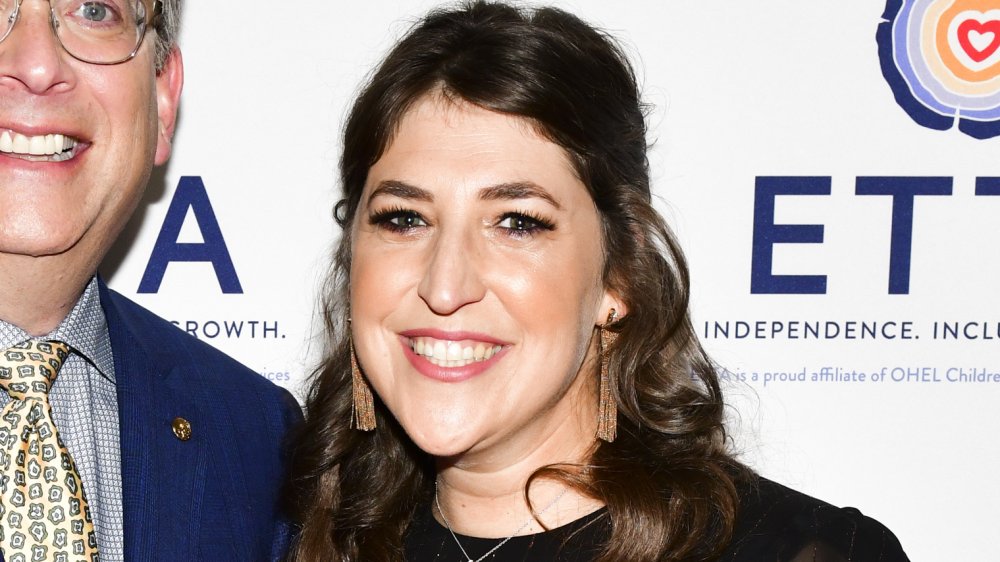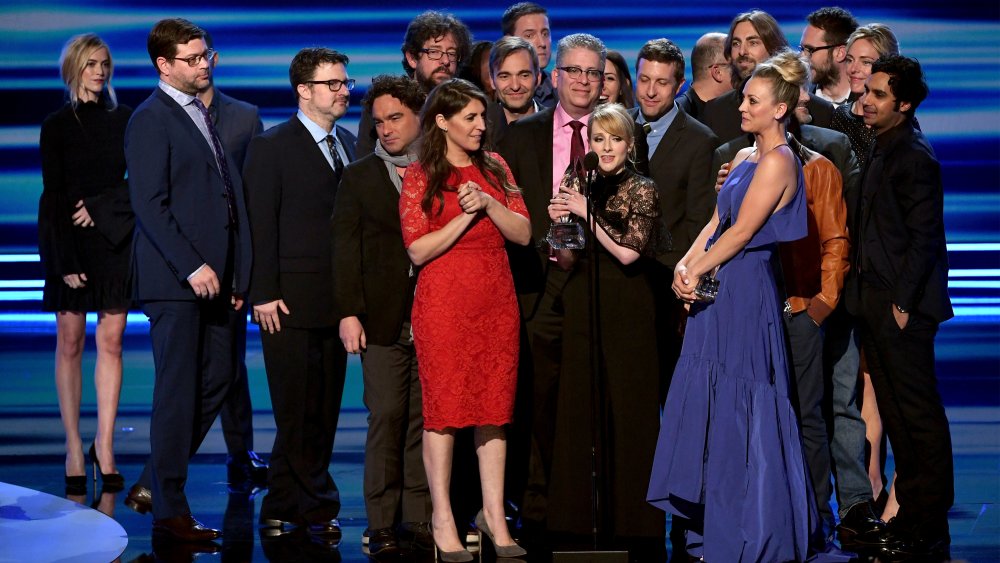We Finally Know Why The Big Bang Theory Got Canceled
As Big Bang Theory fans know well, sooner or later, it happens to all of us: Our favorite TV show comes to an end. With the rise of streaming services like Netflix and Hulu, there are so many entertaining options in TV shows and movies, but sometimes it feels nearly impossible to replace a favorite series that is no longer in production.
The Big Bang Theory is, unfortunately for its fans, one of those TV series that finally ended in May of 2019, as noted by the Los Angeles Times. The show didn't do too badly in terms of longevity and made it through a full 12 seasons. Its lineup included a memorable and perhaps, for some, even relatable cast of characters, including the lovably neurotic Sheldon Cooper, played by Jim Parsons. Other familiar characters included those portrayed by actors Johnny Galecki, Kaley Cuoco, Simon Helberg, Kunal Nayyar, and Mayim Bialik, to name a few.
"It was a monster hit for network television — for television in general," Kelly Kahl of CBS Entertainment told the LA Times. As such a "monster hit," we have to wonder why in the world the series ended. Now we finally know why it got canceled.
The Big Bang Theory almost didn't happen
Though it went on to have a successful run of 12 seasons, The Big Bang Theory almost didn't get picked up by a network. The Hollywood Reporter reported that Steve Holland, showrunner for a time during the production of the hit TV series, stated that the show's producers didn't really think it would amount to anything even close to what it turned out to be.
In fact, this beloved series almost didn't even include the stunning Kaley Cuoco, who played Penny, the nearby neighbor to Leonard and Sheldon. CBS originally planned to bring in actress Amanda Walsh to play Penny rather than Cuoco. It's a little hard to imagine the show without the vivacity that Cuoco brought to her portrayal of Penny, isn't it?
It's impossible to know whether Walsh would have brought as much chemistry to the set as Cuoco did, but luckily CBS ultimately chose to produce the series after it was reworked and had Cuoco in the cast.
There were hints of The Big Bang Theory's impending end
The Big Bang Theory made it past the initial cutting floor and flew through 12 seasons, but there were hints of an impending conclusion even earlier than the actual series finale date in May of 2019. In a podcast interview with actor David Tennant on David Tennant Does a Podcast With..., Jim Parsons revealed some additional details about the series and his thoughts on when the contracts could end. Parsons told Tennant of the last contract for the series that spanned the final two years, "I kind of had a suspicion in my heart, I think, that that was going to be it for me when I did sign that contract, but you never say never and who knows."
Without those last two seasons, viewers would have missed out on quite a lot that happened in each of the characters' lives. The series finale alone was jam-packed with surprises and interesting twists that involved a Nobel prize, an unexpected pregnancy, and even more, as noted by USA Today.
Jim Parsons' exit really ended The Big Bang Theory
On The Big Bang Theory, Jim Parsons' character, Sheldon, had multiple quirks that we came to love and know as the geeky physicist's. Most of the time, those quirks annoyed and even angered the other characters on the show. Despite all of this though, Sheldon seemed to be the main star of The Big Bang Theory in many of its fans' minds. It really isn't terribly astonishing then that the producers just couldn't envision continuing the series without Parsons.
Before deciding to leave the show, Parsons had a few life events going on behind the scenes, including a dearly beloved dog's passing, and these personal events contributed to his decision to walk away from the show once his contract was finished, as he relayed on his David Tennant Does a Podcast With... podcast episode. And Chuck Lorre, one of two creators of the show, told the Los Angeles Times that he "just couldn't imagine doing this show if any of the principals were not there."
There was nothing left to say on The Big Bang Theory
The fact that Jim Parsons revealed he was ready to walk away from the show begs the question: Why? Many actors and actresses juggle personal struggles with filming movies and TV shows, but Parsons made the decision to finish out his contract and not renew it, ultimately bringing The Big Bang Theory to its end. In an interview with Entertainment Weekly, Parsons elaborated on a few professional reasons why he felt the time was right to pursue other avenues. "It felt like we have been able to do this for so many years now, it doesn't feel like there is anything left on the table," Parsons told the publication. "Not that we couldn't keep doing it, but it feels like we've chewed all the meat off this bone."
It seems that Parsons just felt the time had come to end the series, since there wasn't quite as much left to say after 12 seasons of filming. We have to admire Parsons' priority of keeping things interesting and fresh for viewers!
Jim Parsons' late father's role in the cancelation of The Big Bang Theory
We know Jim Parsons' professional opinion seemed to involve some concern for preventing the show from getting stale. We also know he had some behind-the-scenes situations happening during the tail end of the series, and it turns out that his late father also played a role in his decision to walk away from The Big Bang Theory, as Parsons shared on actor David Tennant's podcast, David Tennant Does a Podcast With...
When making his decision about whether or not to continue doing the show, Parsons, who was starring in a Broadway production during the final two years of taping the TV series, spent some time remembering his father, who had passed away at the age of 52. Parsons came to the stunning realization that he would be 46 years old when the show concluded in May 2019. The fact that this was only six years away from the age when his father died seemed to serve as a bit of a wake-up call for Parsons, who noted that he thought, "I think there's other things I need to try and do."
Jim Parsons may not have connected to his Big Bang Theory character as much
It's not hard to imagine that it could become difficult for actors to separate real life from their characters' lives. Sometimes, fiction and real life do intersect or even mirror each other at times. This seemed to be the case for Jim Parsons and his Big Bang Theory character, Sheldon, who shared some similarities throughout the 12 seasons of the show. At the start of the series, both Parsons and his character were unmarried and didn't have large circles of friends. Now Parsons is married, and eventually, his character in the series married as well. Perhaps the journey on screen and off became a little too closely related for Parsons to want to continue filming? Or maybe Parsons simply felt he could no longer connect with Sheldon as much anymore.
In an interview with The Hollywood Reporter, Parsons observed, "It has been fascinating to think about who I was 12 years ago," mentioning that it sometimes seemed a bit harder to "[learn] a line or [say] a line of Sheldon's" as the show went on.
The Big Bang Theory's filming style became outdated
It may come as a surprise to be informed that the style of The Big Bang Theory series is actually almost obsolete. The main difference in its filming style compared to other shows involves camera usage. Specifically, single-camera versus multi-camera shooting. As Screencraft explains, single-camera use is something that has become more commonplace for TV shows filmed within the last ten years or so. The term "single-camera" is actually rather misleading because it doesn't refer to the number of cameras utilized for production. Instead, it essentially signifies that the series was filmed with no audience so it feels more like a movie set than a TV show.
The Big Bang Theory was a multi-use camera production, meaning most of their scenes were shot in front of an audience. That's right: People were able to sit in and watch the filming of their (presumably) favorite TV show. While this type of filming is no doubt a fascinating experience, it seems that networks are moving away from live studio audiences for comedy sitcoms, making The Big Bang Theory something of a dinosaur in today's world.
The Big Bang Theory's ratings were dropping
Ratings are the lifeblood of television. Pilot episodes get killed if ratings are low, and an entire series may be cut if viewers aren't tuning in as expected. One interesting detail to note about The Big Bang Theory is that its ratings were on the decline during some of the last few seasons. While in its 2015-2016 season, the series raked in over 20 million viewers. During 2016 and 2017, the season's ratings dropped and pulled in about 1 million viewers fewer than the prior season (via Entertainment Weekly). By 2018, the mean number of viewers the series garnered each week hovered at approximately 18 million.
One or two million fewer viewers may not seem like such a huge deal at first glance. After all, when the numbers are in the millions like this, what would a drop of 2 million viewers amount to? While the ending of the show wasn't necessarily attributed to this drop in ratings over three seasons, it presumably factored into the decision to draw the series to its final conclusion in 2019.
The Big Bang Theory's real demise may have begun in Season 8
The Big Bang Theory officially saw its end in 2019, with the conclusion of Season 12. But could the beginning of the end have started even sooner than that? That appears to be the case, according to an article published by Metro. Fans of the show will likely recall that the premise of the series originally centered on a group of nerdy scientists, all of whom were single. While the humor and group of friends remained a constant throughout all 12 seasons, there was something that fans may not have cared to see as much of: the romance factor.
"The show was about friendship and not judging a book by its cover, but fast forward to Season 8 and all the characters are in relationships, two with each other, and the clever jokes about science have been replaced with ones about relationships and dating," Daniel Clifford of Broadband Choices explained to Metro. Could it be that the script writers struggled even back in Season 8 with new material? Perhaps this is why romance began to play a larger role in the series, possibly even contributing to the decision to end the show.
With age comes... creepiness?
There is an old saying that with age comes wisdom. In some cases, this old adage can most certainly hold some truth to it. In the case of The Big Bang Theory, however, this saying doesn't seem to hold water. Actually, the show didn't really seem to age all that well, according to one piece published on The Guardian. The article went so far as to state that the idea behind the show was becoming "as creepy as it is depressing."
The Guardian made an interesting observation with this statement. When the show began, the characters were young people who were roommates and friends. But by Season 12, some of the actors were in their 40s, generally an age when people tend to either live on their own or with a family rather than with friends or roommates. While 40 is not old by any means and aging is something that inevitably occurs, in this particular case, with age came a slight creepiness factor since the characters clung still to one another as grown men.
The stars of The Big Bang Theory weren't shocked by its cancelation
Fans may have been shocked, and likely at least a little heartbroken, at the cancelation of the series. However, The Big Bang Theory cast members didn't seem too surprised that their 12-year run was ending. E! News interviewed Johnny Galecki, whose character, Leonard, was a mainstay of the series. Galecki mentioned that the actors did talk about the show's end, though apparently it was mainly just to share the cast's collective sadness when the series would come to a close. Galecki stated, "But I think at this point everyone's very comfortable with 12 seasons being a good time to go home and see our families."
It seems, according to Galecki's point of view, that the cast as a whole was content with their 12 seasons. If so, this must have made it easier all around for the cast and crew to finish wrapping up the filming of the series. It is somewhat comforting, in a sense, that the actors were fine with letting go of the show.
Could CBS have been tired of paying The Big Bang Theory cast big salaries?
Along with measuring ratings, money is another big player in the determination of whether or not sitcoms will continue for another season. Among the many financial considerations that go along with producing a TV series are the salaries for its cast and crew. Of particular interest, as highlighted by Variety, was a listing of finalized salaries for two of the actresses in the last two seasons: Mayim Bialik and Melissa Rauch. They both signed contracts that brought them each $500,000 for every episode filmed in the last two seasons The Big Bang Theory aired. This amount was actually a huge jump in pay for the two actresses, who'd previously earned between $175,000 and $200,000 for each episode. Meanwhile, Johnny Galecki, Jim Parsons, Kaley Cuoco, Kunal Nayyar, and Simon Helberg were each paid $900,000 for every episode during the final two years of the show, taking a reduction of $100,000 each to help fund the additional earnings for Bialik and Rauch.
With higher salaries for the majority of the cast, some nearing $1 million, CBS may not have found the show to be worth such an exorbitant payout.
The Big Bang Theory was almost renewed for a 13th season
Oddly enough for a show that ended up being canceled, The Big Bang Theory almost got renewed for another season of filming, according to Entertainment Weekly. Apparently Kelly Kahl, president of CBS Entertainment, mentioned that there were "preliminary discussions" happening in August of 2018, which centered on the possibility of filming a 13th season for the series. These talks were evidently news to Bill Prady, the executive producer of the series. His simple response of "Huh" to the news on Twitter spoke volumes, even though it was incredibly short.
Could this discrepancy in responses from executives involved in the show have contributed to the end of the series? It isn't immediately clear, but it is interesting to note Prady's unique tweet in reaction to the announcement of ongoing discussions about filming a 13th season. Of course, Season 13 sadly never happened, so we likely won't ever know for sure what could have been.
Don't hold out for a Big Bang Theory reunion just yet
What is the one piece of good news about a longstanding, successful TV series drawing to its inevitable conclusion? The hope of a reunion down the road, naturally. We don't mean to burst anyone's bubble, but in the case of The Big Bang Theory, it doesn't look like we should hold our collective breath for a reunion any time soon. Actress Mayim Bialik spoke to Metro about the likelihood of a reunion just over one year after the series finale aired. Bialik wasn't aware of any type of reunion show planned at that time, and she added, "Again, there's a lot of legal stuff which is very boring about why shows do have reunions and don't, but I think it's probably too soon."
Our apologies to the fans of The Big Bang Theory to have to report this prediction. Here's hoping for a full cast and crew reunion of The Big Bang Theory sometime down the road!
